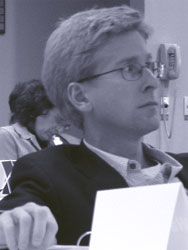
December 2003
Finance Committee to consider possible dues increase for next fiscal
year; last increase in 1999
At its Nov. 14 meeting, the Board of Governors supported the Revenue
Review Study Committee's recommendation to allow the Finance Committee
to consider a dues increase in preparing the Fiscal Year 2005 (FY05)
budget. State Bar President George Burnett directed the committee to
study and make recommendations on whether and in what fashion the Bar
may increase dues.
 |
|
Gov. Michael Waterman of Hudson listens to Revenue Review
Committee presentation.
|
"Historically, dues
increases occur every four to five years. The last increase was in
1999," committee chair and State Bar President-elect Michelle Behnke
told the board. "We must consider all options. Do we raise dues to close
the projected deficit, cut programs, or use some combination of dues
increase and program cuts?"
The exact amount and
timing of any increase will be determined after the Finance Committee
begins its annual budget process, which includes seeking feedback from
State Bar groups on proposed and continuing projects and programs for
FY05. Committee and division requests will be a discussion item at the
January board meeting. Any vote for a dues increase would be scheduled
for the March meeting.
The Revenue Review
Committee reported that nondues revenue sources had been pushed to their
limit and further revenue generation would require a greater investment
in staff and equipment. The committee's presentation also referenced the
Long-range Financial Report that was presented earlier in the meeting.
That report indicated that due to rising costs, continuing the current
public and member services would result in a deficit of nearly $195,000
in FY05.
The board also heard
reports on three new programs proposed for FY05 that, combined, would
require an additional $151,900. These are: practice management
assistance programs; a statewide pro bono program to address unmet legal
needs; and expanding the current Wisconsin Lawyers' Assistance Program
(WisLAP), which aids members who suffer from various impairments or
dependencies.
Governors asked whether
the Bar was operating as efficiently as possible and if the CLE
Department was as profitable as in the past. Referencing Burnett's
column in the October Wisconsin Lawyer, Behnke responded, "It
costs money to produce a seminar. It takes six to nine months to publish
a book." That column also points out that a key part of the Bar's
mission is providing quality CLE programming and books to members and
that over the past four years the Bar's expenses as a percentage of
revenues have declined while the membership census rose by approximately
three percent.
Executive Director George
Brown noted that the Bar is unique in that it produces both seminars and
books that serve niche areas not generally served by commercial
providers. These activities are not always profitable but provide an
important service to members. "There also is increasing competition with
Web-based programs," said Brown. "The Bar has tried to remain the
low-cost professional provider. Even so, we recently raised our prices,
but production costs continue to rise."
The
committee recommended forming a subcommittee of the Finance Committee to
review revenue sources on a two-year basis. It also recommended that the
subcommittee follow the same process that was used during this study:
analyze expense trends, explore revenue sources, review membership
trends, review programs and projects, and consider financial issues and
outside factors such as the general economy and the competitive
marketplace. By looking at all these components, the subcommittee will
be able to make a rational assessment.
Other Revenue Review
Committee members are State Bar Treasurer and Finance Committee Chair
Dean Dietrich, Wausau; Finance Committee member and Board of Governors
Chair Grant Langley, Milwaukee; Board member James Quinn, Wisconsin
Rapids; and former Board member Howard Bichler, Hertel.
Inside the Bar
